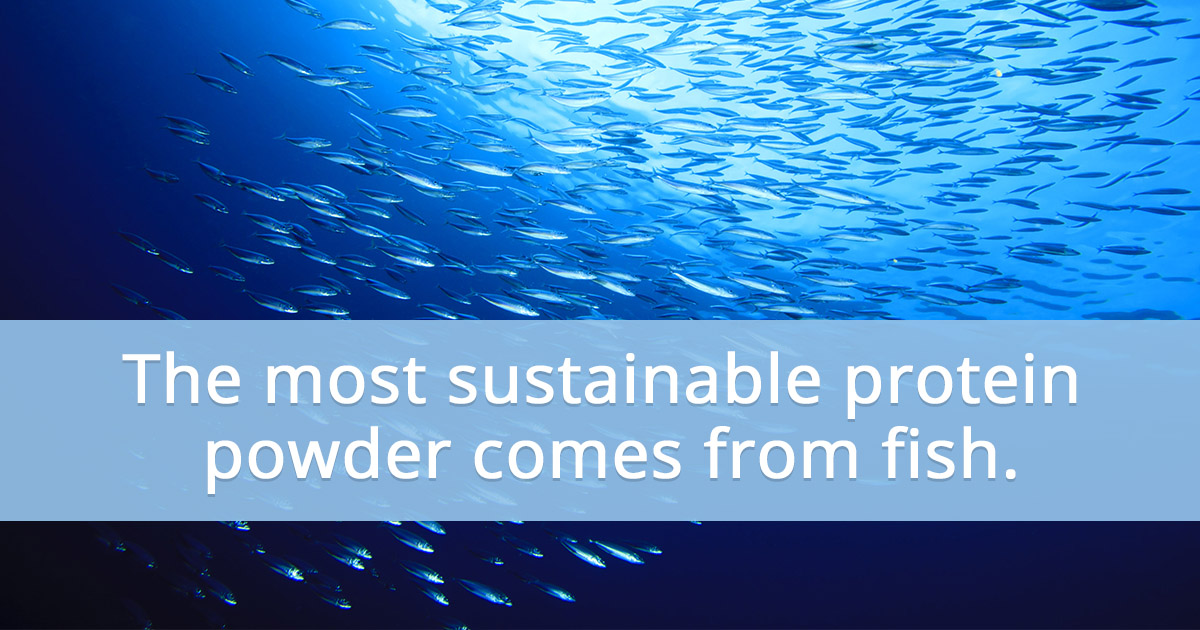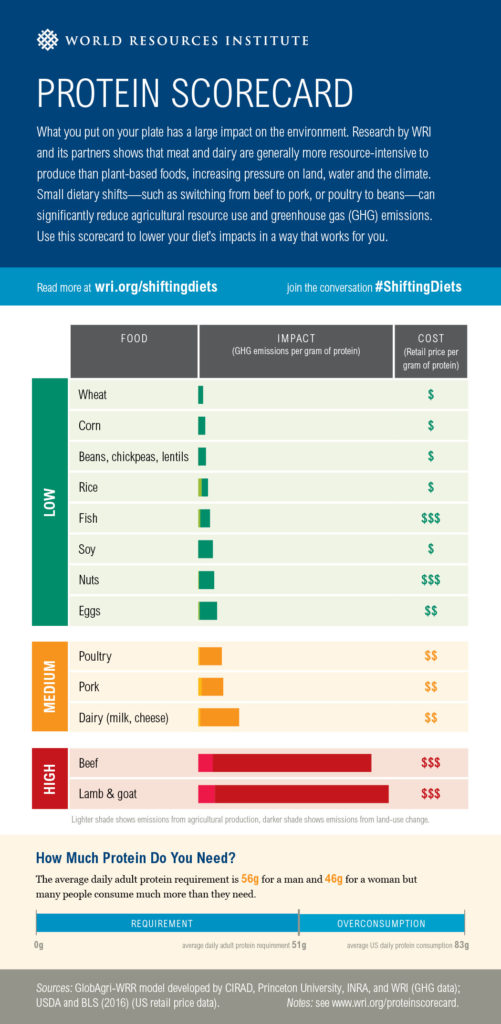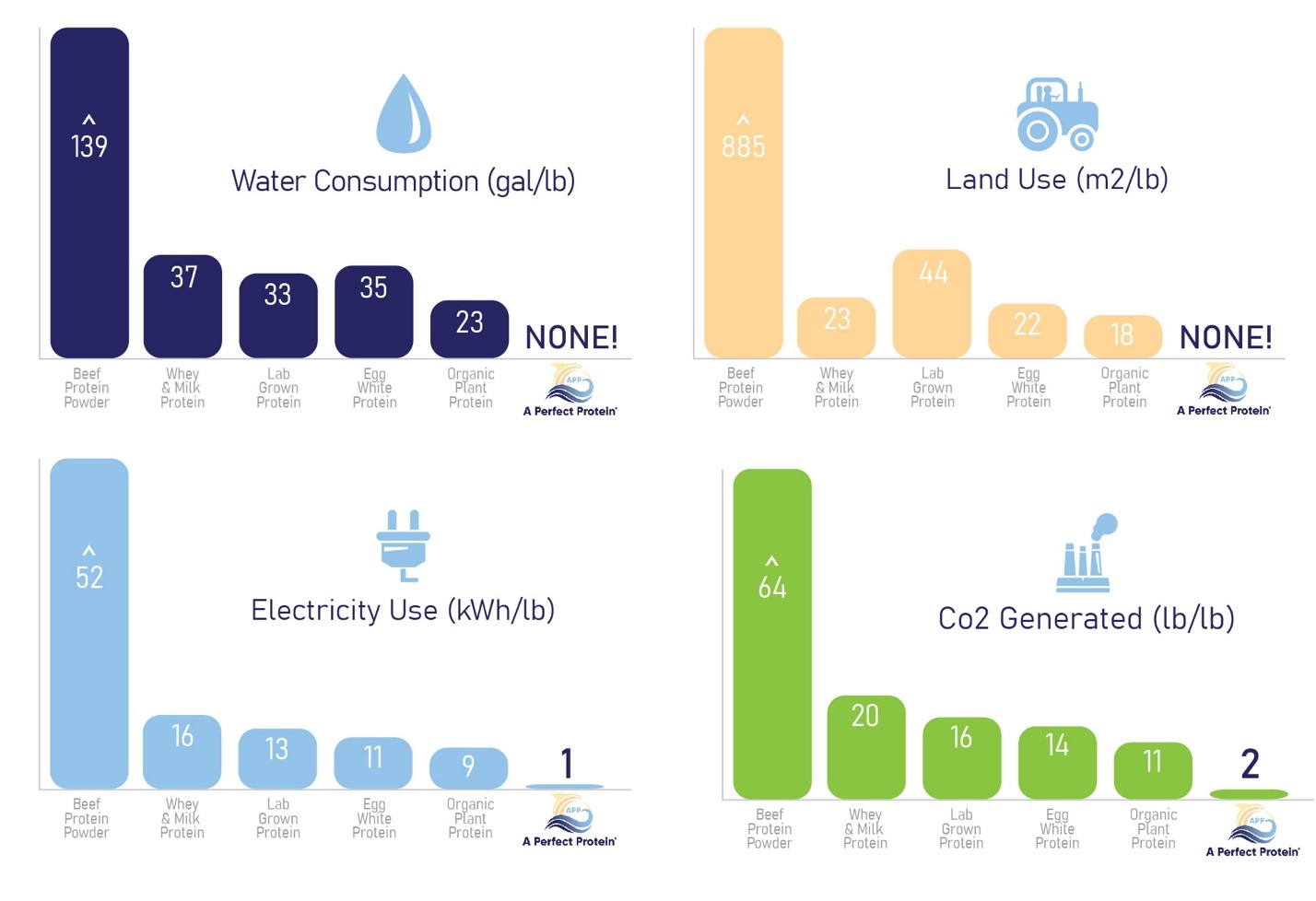
According to the latest peer-reviewed research, shifting to a more sustainable diet is the most consequential way people can reduce their planetary footprints.
Though food is a personal choice with many social and cultural aspects—dietary choices should never be dismissed or shamed—consuming consciously is an easy and meaningful way to help the Earth.
A more sustainable diet means choosing foods with fewer climate change and ecosystem impacts. Simple choices, like eating beef one fewer time per week or switching to a lower-impact protein supplement can add up and make a difference. Any product can call itself “eco-friendly,” but without scientific data on its carbon footprint and biodiversity considerations, it is just green washing.
But how do conscious consumers know what foods are sustainable?
Since it is the most resource-intensive macronutrient, protein data is a reliable way to judge a food’s sustainability.
Cow-based protein like beef and dairy is particularly impactful. Cows are ungulates, meaning they produce enormous quantities of methane (an especially potent greenhouse gas) while they eat. Take a look at the chart below—it compares the climate change impact of different kinds of protein. Plants and fish score well.

Ecosystem effects, like habitat impacts and pollution are also important considerations when judging the sustainability of food. Raising livestock and growing crops requires land and fresh water—both limited resources. Terrestrial food production occupies half of all habitable land on Earth and continues to increase at an unsustainable pace: Beef production is the largest driver of deforestation in the world.
Food production also uses over 90% of the planet’s fresh water and contributes significant pollution with farm runoff. Pesticides, fertilizer, and livestock manure washed away by rain pollutes our lakes, rivers, and oceans. Eutrophication caused by fertilizer runoff is the most immediate existential threat to marine life.
Fish is the best source of protein for the planet.
Wild-caught fish require no land, fertilizer, pesticides, or fresh water. When harvested sustainably, fish are the lowest-impact protein you can buy. Strong scientific evidence supports that claim: The most comprehensive research on the environmental impacts of animal protein concluded that wild-caught seafood has the lowest carbon footprint and lowest eutrophication potential compared to all land animal protein and farm-raised seafood. However, with so many different kinds of fish, there is some variance in impacts. For example, crab and lobster boats need to constantly start and stop their engines to lay lobster traps—all that stopping and starting burns more fuel per gram of protein produced than an anchovy boat that can scoop up a ton of fish in one net set.
Pacific whiting is one of the lowest-impact, most sustainable wild-caught fish.
Our alternative protein powder supplement is made from Pacific whiting (Mercluccius productus), a fish that is especially low-impact: Whiting are targeted using midwater trawls, a fishing method in which a net is dragged through the water column. Midwater trawls are not dragged on the bottom of the ocean, which can be highly destructive (those are bottom trawls). Whiting are schooling fish which ensures bycatch is extremely low—midwater schooling fish tend to school only with their own species meaning other species are not accidently caught in the net.
The carbon emissions impact of midwater trawling is dependent on two things: how far offshore the fishing is done, and how abundant the fish are. Pacific whiting is caught in U.S. waters off the coasts of Washington, Oregon, and California—boats are not crossing oceans to fish them. Further, Pacific whiting are the most abundant, sustainable fish population on the West Coast.
A general rule of thumb is that if a fish is caught in U.S. waters, its population is sustainable. The U.S., through the National Oceanic and Atmospheric Administration (NOAA), manages its fisheries better than any other country on Earth. By weight, 99% of U.S.-caught seafood comes from a sustainable population. Pacific whiting is no exception—they have been sustainably managed for decades.
Pacific whiting are delicate fish, though. Their fillets don’t hold well so they are commonly processed into surimi, or imitation crab meat, but we find they make a perfect protein powder supplement.
Our processing facility is located in California, meaning our fish are not put on a high-emitting cargo ship or airplane. They are trucked to our facility ensuring our product has lower food miles than almost every other kind of processed fish.
Hard data on protein powder
The case for seafood over terrestrial animal and plant-based protein has been made, but let’s look at hard data on protein powder specifically:

The data is clear: our fish-based alternative protein is the most sustainable choice for protein supplementation.
Part of the reason our protein comes out on top is because of the inherent benefits of using fish, but the other major sustainability component is our manufacturing technology.
The conservation potential of our processing facility
Right now, 15 million tons of fish are caught each year specifically for the purpose of feeding livestock and other animals. An additional 10 million tons of unwanted fish are discarded at sea by fishermen. That’s 25 million tons of fish caught per year not consumed by humans.
With malnutrition affecting over 800 million people, that food could go a long way to alleviate human suffering. Read more about the nutrition of our protein here.
The problem is that the 25 million tons of fish are not popular in seafood markets. For example, the global demand for eating anchovy is far lower than the amount caught so most anchovy is turned into fishmeal for livestock feed. When fish is processed into fishmeal, it is ground up, cooked, then dried. It is smelly, gross, and unfit for human consumption. But what if we could turn that excess anchovy into something worth eating? Instead of cows reaping the nutritional benefits of seafood, people do?
Our SEAVIOR manufacturing technology has this potential.
We developed the SEAVIOR processing method to reduce fish into a tasteless, odorless powder that maintains the macro and micronutrient profile of seafood. Our alternative protein can be mixed into soups, sauces, drinks or smoothies; baked with, or processed into other foods like pasta, noodles, or burger substitute. Imagine a world where 25 million tons of fish isn’t wasted, but instead used to make delicious, nutritious food.
Best of all, our SEAVIOR processing method has an extremely low environmental footprint. Rather than use harmful acids to breakdown fish, we use a proprietary method involving heat and alcohol. Our system is closed-loop, meaning we produce zero waste—after we process one batch of fish, the materials are recovered to process the next batch. Because our facility is located in California, most of our electricity is supplied by solar. Our carbon footprint is smaller than any other protein powder, even plant-based ones.
We plan to be in California for the long haul, keeping jobs in the U.S. and “Made in USA” on our packaging. Our factory was just approved by the FDA and production is ramping up. We are proud to offer the world’s most sustainable alternative protein powder. Give us a try today.
